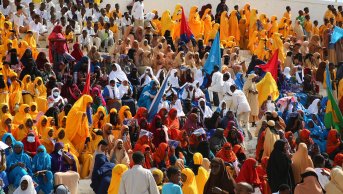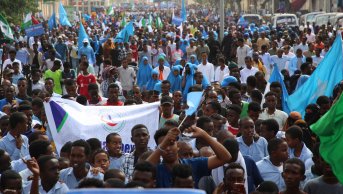The Current State of the Civil War in Sudan and the Responsibilities of the International Community

Following the ousting of Omar al-Bashir in April 2019, Sudan entered a tumultuous period. Under Bashir's nearly three-decade-long rule, the Sudanese people grappled with economic hardships and political oppression, culminating in demands for change through protests that began in December 2018. However, even after Bashir's overthrow, Sudan continued to face similar challenges. The civilian population's calls for the establishment of a civilian government were not fully met, and while the formation of a Sovereign Council composed of civilians and military officers, along with a transitional civilian government led by Abdullah Hamdok, appeared to be a beacon of hope, the process was disrupted by a coup in October 2021 led by Army Commander Abdel Fattah al-Burhan and Rapid Support Forces (RSF) Commander Mohammed Hamdan Dagalo.
The political landscape in Sudan has become increasingly complex due to the power struggle between Burhan and Dagalo. The conflicts that erupted on April 15, 2023, have not only affected Sudan's internal dynamics but also had profound implications for regional and global politics. These conflicts have adversely impacted the country's socio-cultural fabric, economy, and daily lives of its people, exacerbating Sudan's already fragile situation.
The deepening crisis has heightened the interest and intervention of global and regional actors in the disputes among Sudanese groups, making the resolution of these challenges even more daunting. These comprehensive problems have strengthened civil society's longing for stability, peace, and democracy but also underscore the complexity of finding a solution.
The situation in Sudan represents not just a power struggle but also a thwarting of the people's desire for a fairer, more prosperous, and freer society. Therefore, Sudan's future closely ties with the cessation of internal conflicts, the establishment of political stability, and economic development, supported by the international community and collaboration among local actors.
Political Instability and Power Struggles
The political vacuum following the removal of former leader Omar al-Bashir has ushered in a new era of power struggles in Sudan. This phase has become even more challenging due to the issues of power-sharing between Abdel Fattah al-Burhan and RSF leader Mohammed Hamdan Dagalo. The conflicts between Burhan and Dagalo that flared up on April 15, 2023, represent the latest phase of this instability.
Since the military intervention in October 2021, the inability of Burhan and Dagalo to agree on the appointment of a prime minister is just the tip of the iceberg of political conflict. Although a temporary solution seemed to have been reached with the "Political Framework Agreement" mediated by the African Union, United Nations, and IGAD in December 2021, subsequent developments have deepened the discord between the two leaders.
Actions such as Dagalo's regret over the October 2021 intervention, his wearing of civilian clothes for diplomatic talks, and requests for military helicopters from Russia have heightened tensions between the two leaders. Disagreements over the timing of the integration process between the RSF and the Sudanese army have been a fundamental cause of conflict.
A notable aspect of recent conflicts is Dagalo's outreach to civilian political alliances, especially former Prime Minister Hamdok's Takaddum initiative. Dagalo's efforts to establish a civilian administration in Al Gezira state could potentially serve as a model for other regions.
The North Darfur region, particularly the city of El Fasher, has become a focal point for changing conflicts and alliances. Here, the withdrawal of the Sudan Liberation Movement-Transition Council (SLM-TC) from the Joint Forces of the Armed Struggle has affected the regional power balance.
Therefore, the complex political and military landscape in Sudan signifies the continuous change of alliances within the country's internal conflict. The clash between Dagalo and Burhan, alongside the movements of regional forces and small armed groups, continues to play a decisive role in the country's future. This situation indicates that the political instability in Sudan is closely linked not only to internal factors but also to regional dynamics.
Regional and Global Interactions of the Conflict
The internal conflict in Sudan is closely monitored and influenced by regional and global actors. The United Nations, the United States, the Intergovernmental Authority on Development (IGAD), and neighbouring countries agree that a military victory for any side would be futile. These actors have called for a cessation of hostilities to initiate a political process.
For instance, Saudi Arabia and the US have sought to mediate the resolution of the internal conflict in Sudan. Both countries have led efforts to initiate negotiations between the army and the RSF in Jeddah, aiming for a ceasefire agreement that includes halting hostilities, opening humanitarian corridors, and evacuating foreign nationals. Additionally, the US Congress has appointed a special envoy to focus more on the situation in Sudan. Moreover, various Western media outlets and a report presented by the Sudanese army to the UN have claimed the UAE's support for the RSF, highlighting the need for a balanced and comprehensive approach by regional and global actors in a conflict environment marked by shifting alliances.
While negotiations and international mediation efforts can contribute to resolving the conflict, external interventions do not always yield the expected outcomes and may lead to parties hardening their positions. Hence, the international community's policies towards Sudan, despite positive steps towards resolving the conflict through negotiations and mediation efforts, remain uncertain, exacerbating the humanitarian crisis.
Humanitarian Situation
The ongoing internal conflict in Sudan has deeply affected nearly half of the country's almost 50 million population. According to UNICEF, 14 million of these individuals are children, all in dire need of essential humanitarian aid. The International Organisation for Migration reports that the conflict has displaced over 3 million people within the country, with more than a million seeking safer havens in neighbouring countries. Furthermore, over 6 million people living under the threat of famine face extremely challenging conditions.
While the international community and some countries have attempted to extend aid to those affected by the conflict, their efforts have fallen short. The United Nations has pledged a $1.5 billion aid package to assist Sudan and those seeking refuge in surrounding countries, though the actual needs are estimated at $2.6 billion.
In this context, initiating a peace and mediation process among the parties in Sudan seems challenging. However, the efforts of international and regional actors in mediation are crucial for alleviating the current humanitarian crisis and finding a long-term solution. This situation underscores the importance of global cooperation and determination to overcome a crisis that demands urgent action.
This article was published on Sabah website on April 6, 2024 with the title " Sudan İç Savaşında Mevcut Durum ve Uluslararası Toplumun Sorumlulukları"








